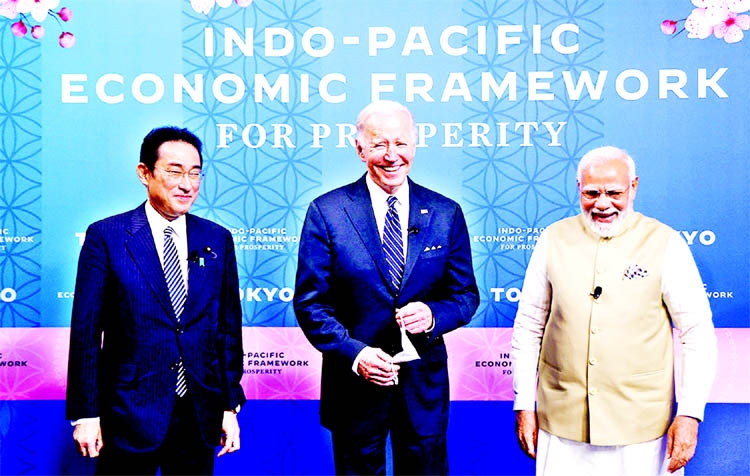
Al Jazeera :
Taipei, Taiwan – US President Joe Biden says he would use force to defend Taiwan if it was attacked by China, appearing to signal a shift away from Washington’s decades-long policy of so-called strategic ambiguity towards the East Asian democracy.
Biden made the remarks on Monday while visiting Japan, where he is on the second leg of his first trip to East Asia since taking office last year.
Responding to a reporter’s questions about Taiwan at a press conference with Japanese Prime Minister Fumio Kishida, Biden said defending Taiwan was a “commitment we made”.
He said while the US agrees with the “one China policy” – which states there is a single China but does not define it – the idea that “Taiwan can be taken by force” is “not appropriate”.
He warned Beijing was already “flirting with danger right now by flying so close and all the manoeuvres undertaken” – referring to a growing number of Chinese sorties, naval exercises and other power projection in the Taiwan Straits.
Beijing still claims Taiwan, whose formal name is the Republic of China, as a province and has not ruled out unifying the two sides by force.
China responded immediately to Biden’s comments saying “no one should underestimate the firm resolve, staunch will and strong ability of the Chinese people in defending national sovereignty and territorial integrity”.
“China has no room for compromise or concession,” foreign ministry spokesman Wang Wenbin said.
Taiwan’s foreign affairs ministry said it welcomed Biden’s comments for “reaffirming” Washington’s “firm commitment to Taiwan” and would deepen cooperation with countries including the US and Japan.
“The challenges China poses to the security of the Taiwan Strait have aroused great concern to the international community,” a spokesperson said. “Our government’s firm determination to defend Taiwan’s freedom, democracy and security has never changed.”
The comments mark the third time that Biden, 79, has made such a statement only for it to be quickly walked back by White House staff.
Shortly after Biden’s remarks on Monday, an unnamed White House official told reporters there is “no change in US policy towards Taiwan”, according to Reuters news agency.
Matthew Kroenig, deputy director of the Atlantic Council’s Scowcroft Center for Strategy and Security, said while it is debatable whether or not Biden misspoke, the president’s remarks clarify his thinking on Taiwan.
“Some say it’s a carefully coordinated campaign of ambiguity. Others say that Biden is senile and misspoke. I would argue that at this point the reason doesn’t really matter,” Kroenig told Al Jazeera. “In the event of a war, it would always be up to the president to decide whether to intervene or not regardless of the formal policy. We now have a clear window on what Biden’s decision would be.”
Analysts say the US appears to have been moving away from strategic ambiguity in favour of “strategic clarity” for some time.
“This is both a useful ‘slip of tongue’ and a revealing reflection of a widely shared assumption within the US government. Biden has done this multiple times before, be it at the CNN Townhall in early 2021, or his statement about the non-existent ‘Taiwan agreement,'” Wen-ti Sung, a political scientist who teaches at Australian National University’s Taiwan Studies Program, told Al Jazeera.
“This time Biden’s statement itself seems illogical but the sentiment and signal it sends are politically very useful,” Sung added.
Under Biden’s predecessor, Donald Trump, Washington launched a sweeping trade war against China and boosted ties with Taipei through arms sales and diplomatic visits.
The US has long promised to help Taiwan defend itself under the 1979 Taiwan Relations Act, but it has stopped short of pledging to send troops or directly participate in any conflict.
The Act says only that the “United States will make available to Taiwan such defence articles and defence services in such quantity as may be necessary to enable Taiwan to maintain a sufficient self-defence capability.”
The commitment was made as an assurance the US would not abandon Taiwan after Washington officially severed ties with Taipei in favour of Beijing that same year.

